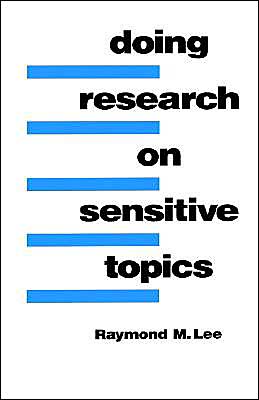

 |

|

The average rating for Doing Research On Sensitive Topics, Vol. 1 based on 2 reviews is 4 stars.
Review # 1 was written on 2016-11-05 00:00:00 Michelle Decarvalho Michelle DecarvalhoIt's a rare book that almost 25 years after its initial publication can remain close to the definitive word on its topic, especially in an area as fluid as research design. Although there are some foundational aspects of research design, questions of research ethics in particular have been in a state of flux in the last 15 years or so - not because we've been undergoing a shift in ethical outlooks and judgements, but because we have begun to realise across many research communities that the approaches based in biomedical sciences and developed from the middle of the 20th century do not necessarily fit other forms of research and other research traditions. The question of 'sensitivity' has been part of that revision, as we have become more sensitive to participant well-being. It's a sign of Lee's insight and subtlety that so much of his case here remains valid - although some of the method-specific discussion has been made redundant by changes in technology, but we'd expect that. 'Sensitive issues' are one of the touchstones of research ethics, as a concern for participant well-being means that we set out to minimise their discomfort because it means that we are likely to get better evidence/data and because one of the premises of research ethics is that participants do not suffer unnecessary discomfort as a result of their participation in our projects. Lee rightly notes however, that for the most part we take for granted that we all know what a 'sensitive issue' might be: 10 years of chairing my University's research ethics committee tells me that is not the case. Some things are straightforward; there is little doubt that investigations of eating disorders are exploring a sensitive issue, but many people would not necessarily see an investigation in studies exploring the relationship between mathematics ability and gender or 'race'/ethnicity (a topic Lee cites on p3) - yet there are possible profound negative social implications of a positive relationship being demonstrated there. Lee in trying to define 'sensitive issues' explores forms of threat - such as intrusiveness, or the possibility of sanctions being imposed on a group as a consequence of research findings, or the political threats linked to research (such as in conflict zones). He is also sensitive, in ways many researchers are not, to the possibility of threats to researchers - which might physical, emotional or psychological, or might be labelling by association (what some, in the jargon of the field, call stigma contagion). He, productively, identifies the things we often readily include in these discussions - questionnaire and interview design, access to participants (leading to a strong emphasis on anonymity) and handling of sensitive data (so issues of confidentiality are widely discussed in research design). He also highlights less obvious or commonly explored issues, such as how we go about estimating population size in 'hidden' populations, or approaches to sampling a hidden, rare or 'deviant' (a highly problematic word) populations, as well as disclosure and dissemination of research findings on these topics. This is not a book of rules - we know that the rule-based approach is a bad way to manage and govern questions of research design given that every project is different - but a discussion of issues, highlighting concerns and in many cases exploring ways that researchers have dealt with those issues. He has drawn on a wide range of social research to develop those cases and that discussion, with a strong orientation towards sociology and social psychology (I would like to have seen a little more anthropology in the mix, given its sensitivity to the everyday and the cultural difference and long term immersion in research settings). As such, it is an excellent book for education and consciousness raising, making researchers aware of the likely complexities of their topics. I work closely on these issues, lead my university's work on research ethics and integrity and am delighted to see that coming back to this over 15 years after I first read it I can still be surprised and challenged by aspects of the case. At a time when issues of research ethics and integrity are of real significance, when in many settings academics are required to be alert to student research that might suggest political 'radicalisation' and when research itself is becoming increasingly applied and increasingly collaborative we need to be attuned to these issues of sensitivity. This is even more so and more and more often our work is developing inter-disciplinary characteristics, and we are seeing clashes of taken-for-granted aspects of research traditions and disciplinary conventions. For these reasons, every researcher should read this; they should also read it because it is an excellent book about doing research well. |
Review # 2 was written on 2021-01-20 00:00:00 John-ruhne Nilsen John-ruhne NilsenMind blown! Polletta explores the use of storytelling and its devices in politics, protest, and the law, in order to tease out its many uses and abuses. Her book uses case study chapters to look at how stories mobilize people to political action, but also how they can reinforce assumptions based in existing power, gender, and racial structures. Once you get past the academic jargon, the book has so much to offer, especially at a time when we've come to understand how many evils a good story can cover up, even one with few words: "We're going to build a wall and Mexico is going to pay for it." |
CAN'T FIND WHAT YOU'RE LOOKING FOR? CLICK HERE!!!